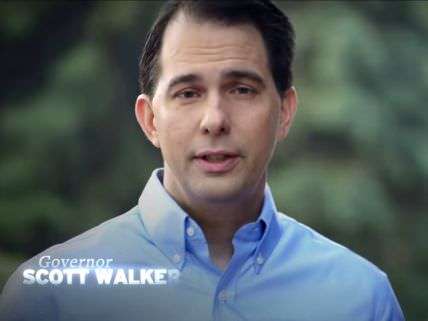Scott Walker Tries (and Fails) to Clarify His Position on Marijuana Legalization
Federalism and the urge to bash Obama pull him in opposite directions.

In a column last month, I noted that Wisconsin Gov. Scott Walker, who is seeking the Republican presidential nomination, had not taken a clear position on the proper federal response to marijuana legalization in states such as Colorado and Washington. He still hasn't, although not for lack of trying. Via BuzzFeed News, here is how Walker addressed the question in a radio interview on Wednesday:
Host: In 30 seconds, would your Justice Department go after Colorado for legalized marijuana sales?
Walker: For me I think that should be a state issue, but I also think that you can't ignore the laws. And until the federal government changes the laws, you don't get to pick and choose in a just society whether you enforce the laws or not. You have to change them.
Host: So yes, you would go after Colorado?
Walker: Well, I would enforce the law that was on the books no matter what it is. And again if we are going to change it, change it in the Congress. I believe it is a states' issue, so I don't have a problem changing it. I don't think marijuana is something that should be legalized. I've opposed it in my own state because law enforcement in both political parties have warned me that that's a gateway drug. They worry it would open the door to others out there. But to me I still think that's something best handled at the state level. But the federal level, you've got to change the law. You don't just get to pick and choose what laws you enforce.
Walker seems torn between the federalism that Republicans traditionally support (in theory, at least) and their criticism of President Obama's lawless ways. The result is barely coherent. Although it's true that Obama has been known to ignore the law when it's inconvenient (as have his predecessors from both parties), his response to marijuana legalization is not a good example of that tendency. The Justice Department, for good and ill, has a great deal of discretion in enforcing the Controlled Substances Act. Its current policy of focusing on marijuana offenders who violate state law or impinge on "federal enforcement priorities" uses that discretion in a way that respects state policy choices, which is something federalists should welcome.
According to the Supreme Court's 2005 ruling in Gonzales v. Raich, the power to regulate interstate commerce authorizes the federal government to enforce its ban on marijuana even in states that have legalized the drug for medical or recreational use (indeed, even against people whose marijuana-related activities are confined to their homes). The Court's absurdly broad reading of the Commerce Clause should trouble federalists. "If Congress can regulate this under the Commerce Clause," dissenting Justice Clarence Thomas observed in Raich, "then it can regulate virtually anything—and the Federal Government is no longer one of limited and enumerated powers." But even if we assume that the feds constitutionally can arrest state-licensed marijuana merchants, that does not mean they should, especially if you believe, as Walker says he does, that it "should be a state issue."
Instead of promising a crackdown à la Chris Christie, Walker could reconcile his avowed federalism with the sensibilities of social conservatives by embracing the same position many of his rivals have taken: 1) I do not personally favor marijuana legalization, but 2) I believe the issue should be left to the states. That's all he needs to say.


Show Comments (66)